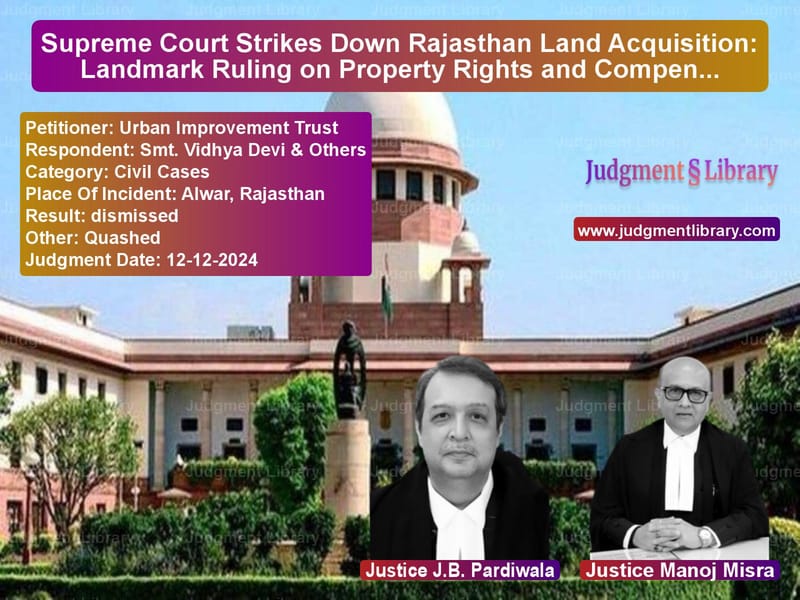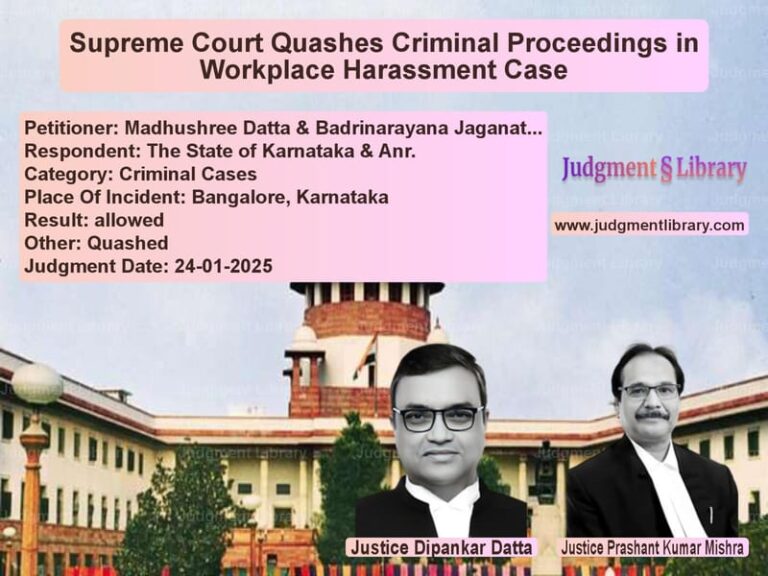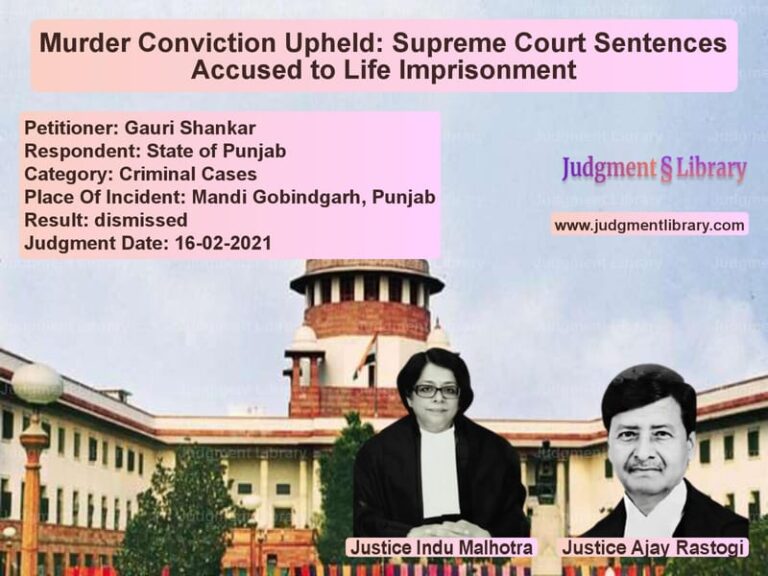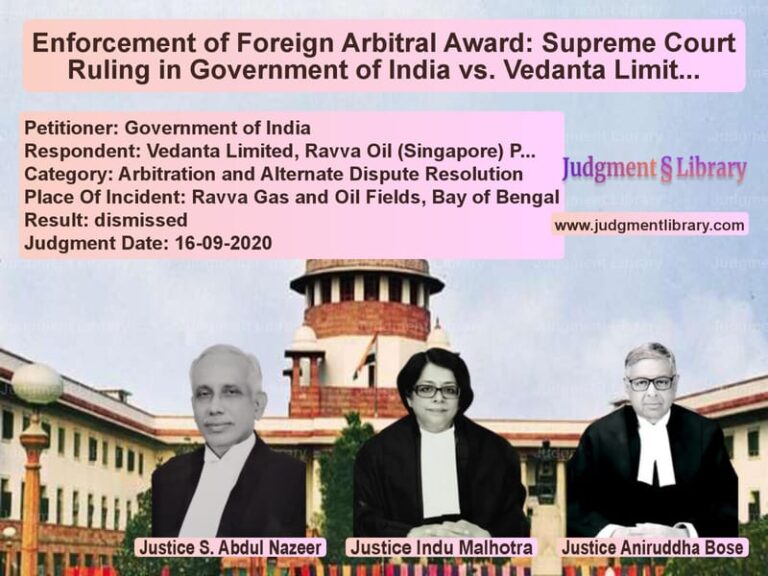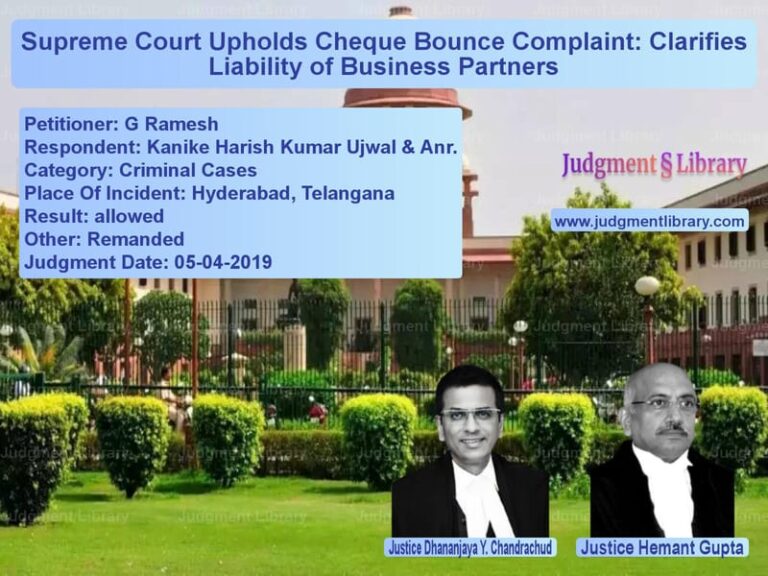Supreme Court Strikes Down Rajasthan Land Acquisition: Landmark Ruling on Property Rights and Compensation
The Supreme Court of India, in Urban Improvement Trust vs. Smt. Vidhya Devi & Others, delivered a significant judgment on December 13, 2024, addressing key issues in land acquisition under the Rajasthan Urban Improvement Act, 1959 (RUI Act). The Court quashed the acquisition proceedings, ruling in favor of landowners who were denied due process and timely compensation.
Background of the Case
The case involves two disputed land parcels:
- Nangli Kota Lands: 5 bighas in Village Nangli Kota, Alwar, owned by the legal heirs of Ram Narain.
- Moongaska Lands: 3 bighas in Village Moongaska, Alwar, jointly purchased by Ram Narain and three other individuals.
On July 1, 1976, the Urban Development Department of Rajasthan issued a notification under Section 52(2) of the RUI Act, proposing to acquire these lands. A subsequent notification under Section 52(1) was issued on June 16, 1977, declaring that the lands were vested with the State. Compensation was settled at Rs. 90,000, but landowners claimed they never received it.
Key Legal Issues
- Was the acquisition valid under the RUI Act?
- Did the state follow proper due process in notifying landowners?
- Did delays in compensation violate landowners’ rights?
- Was possession taken legally before full payment?
Arguments Presented
Arguments by the Urban Improvement Trust (Appellant)
- The acquisition process was conducted under Section 52 of the RUI Act, which allows state acquisition for public purposes.
- Landowners participated in hearings before the Officer on Special Duty (OSD), showing they had full knowledge of the process.
- Compensation of Rs. 90,000 was accepted by landowners in 1980, and the amount was deposited in court.
- Possession was taken in 1980, making further challenges invalid.
- Landowners waited 21 years to challenge acquisition, making their claim ineligible.
Arguments by the Respondents (Landowners)
- The state failed to serve individual notices under Section 52(2), violating their right to due process.
- Compensation was deposited 21 years late in 1997, well beyond the statutory limit.
- Possession was taken illegally before full payment.
- The acquisition violated Article 300A of the Constitution, which protects property rights.
Supreme Court’s Observations
On Delay in Challenging Acquisition
The Court rejected the appellant’s argument that landowners delayed filing their claims. It held:
“Delay cannot override constitutional rights, especially when acquisition violates due process.”
The Court cited Vidya Devi v. State of Himachal Pradesh (2020) 2 SCC 569, stating:
“Delay and laches cannot be raised in cases where property rights are infringed without due process.”
On Lack of Proper Notification
The Court found that notices under Section 52(2) of the RUI Act were not properly served, depriving landowners of their right to object.
“A notification in the gazette alone is insufficient; individual notices and local publication are mandatory.”
The Court emphasized that the right to be heard is essential in land acquisitions, citing Kolkata Municipal Corporation v. Bimal Kumar Shah (2024 SCC OnLine SC 968).
On Compensation and Possession
The Court ruled that landowners were deprived of compensation for over two decades. It held:
“Under Section 60A(4), compensation must be paid within six months of acquisition. Failure to do so renders the acquisition invalid.”
It also cited Ultra-Tech Cement Ltd. v. Mast Ram (2024 SCC OnLine SC 2598), which held:
“Timely compensation is essential; failure to pay within statutory limits violates Article 300A of the Constitution.”
Final Verdict
- The Supreme Court quashed the land acquisition due to procedural violations and delayed compensation.
- The state was directed to return the land to rightful owners.
- The case set a precedent for fair compensation and due process in land acquisitions.
Implications of the Judgment
- Landowners’ rights strengthened: Compensation delays cannot justify forced acquisitions.
- Mandatory due process: Governments must follow proper notification and hearing procedures.
- Judicial oversight: Courts will intervene in cases of arbitrary acquisitions.
- Precedent for future cases: Any acquisition violating procedural requirements can be challenged.
This ruling reinforces the constitutional protection of property rights and ensures compliance with legal procedures in land acquisitions.
Petitioner Name: Urban Improvement Trust.Respondent Name: Smt. Vidhya Devi & Others.Judgment By: Justice J.B. Pardiwala, Justice Manoj Misra.Place Of Incident: Alwar, Rajasthan.Judgment Date: 12-12-2024.
Don’t miss out on the full details! Download the complete judgment in PDF format below and gain valuable insights instantly!
Download Judgment: urban-improvement-tr-vs-smt.-vidhya-devi-&-o-supreme-court-of-india-judgment-dated-12-12-2024.pdf
Directly Download Judgment: Directly download this Judgment
See all petitions in Property Disputes
See all petitions in Landlord-Tenant Disputes
See all petitions in Damages and Compensation
See all petitions in Judgment by J.B. Pardiwala
See all petitions in Judgment by Manoj Misra
See all petitions in dismissed
See all petitions in Quashed
See all petitions in supreme court of India judgments December 2024
See all petitions in 2024 judgments
See all posts in Civil Cases Category
See all allowed petitions in Civil Cases Category
See all Dismissed petitions in Civil Cases Category
See all partially allowed petitions in Civil Cases Category

